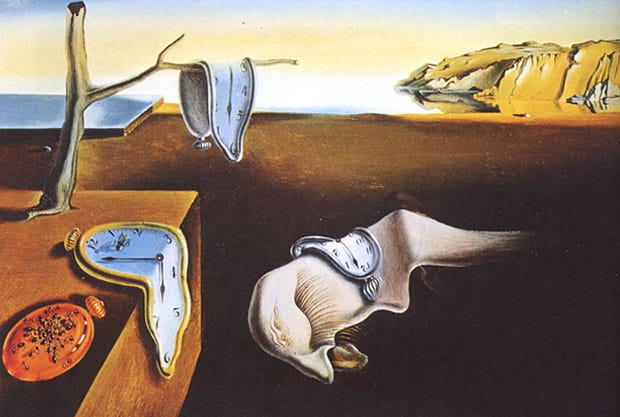There is no TV inside my mind
How do you read a book when you can’t see shit inside your brain?
TV? What TV?
I recently read this wonderful article by Lincoln Michel Counter Craft which was giving authors advice on how to “turn off the tv inside their minds” when writing fiction, to prevent the dreaded Show, don’t tell critique. It’s a really good post, full of great insights about the difference between writing a novel and filming a movie. But what struck me the most was in the comments…
Turns out, this concept of mind TV isn’t just a concept, it’s a reality – for most of you. But I can’t see anything inside my mind. Not an apple, not a horse, not a fully fledged character based on 3 sentences of description. Nothing.
I once heard a blind person explain what they could see (nothing) by asking: “what can you see with your elbow?”. The answer isn’t black, it’s not a blank space, it’s nothing! And while I’ve been blessed with mediocre eyes and a -6 prescription, nothing is exactly what I see inside my mind.

The inability to form mental images is called aphantasia. It’s not a disease, a disorder, or something that needs fixing – it’s just a different way of experiencing the world. About 3-5% of people are estimated to have it, though most don’t even realize they do until they stumble into a conversation about “visualizing” something and wonder why everyone is treating imagination like a Pixar studio in their heads. I have a rather “severe” form of it (if you can call it that), which means I can't picture anything at all in my mind.
You might think this lack of mental imagery would make me hate reading. After all, isn’t part of the magic of books being able to “see” the story unfold in your mind? For some people with aphantasia, that’s true – it can make it harder to connect with certain types of writing. But for me, it’s never been a problem when it comes to enjoying science-fiction or fantasy novels.
Don’t make me feel like a failure
With all that said, I hate, hate, hate reading books set in our modern times. No matter how hard I try, how well it’s written, I always end up feeling bleh, like I’m missing half of it. And in a way, I am! Those books rely on the reader knowing and recalling the setting so much that, when my mind fails to represent the scene, I end up with a big black hole in the plot.
The romance author will tell you of a hot billionaire in a suit, in his high rise apartment, and you will fill in the blanks, but I can only conjure up some vague idea of “desirable”, not even an image, just a sketch of a feeling.
By comparison, fantasy worlds are inherently unimaginable – dragons and alien landscapes don’t come with real-world expectations! The author must describe all the important parts and set an atmosphere otherwise the reader can’t follow them – that world only exists inside their mind after all.
I also don’t feel the same problem with historical (or pseudo-historical) books – so long as the time period is remote enough that the writer has to spell it all out! To me, gowns and castles and armies of servants or rundown wagons and dying of the plague are equally as distant as dragons and spells, and so the magic occurs and I’m entertained.
But words are fickle, and can never truly render the world as the characters see it! A common criticism of fantasy is that people struggle to see all the details and don’t understand the need to reinvent the wheel, the cities, or even the horses. In my case however, it levels the playing field, and I stop feeling like a first grader fighting for every word on the page. I feel much more in sync with what the author wants to show everyone, instead of lagging behind in a 128px resolution.
Can you see my concepts?
Even better, science-fiction and “hard magic” fantasy tends to be full of concepts. I don’t care so much for the 6-packs bat-winged shadow daddy1, but i LOVE me a super-intelligent spider society that evolved into cities and formed their own versions of governments2!
Abstract concepts can be seen (that’s like, the definition of abstract), so once again I am on the same level as you, normal reader. Big ideas of warfare and time travel and magic wards don’t require any realistic imagery – although some of you must like them since they end up all over the pretty endpapers!
Big ideas are the bread and butter of my entertainment. I gravitate toward works that challenge my mind, that make me question how the world works or imagine how it could work under different conditions. Asimov’s Laws of Robotics3 aren’t just rules for machines; they’re a lens through which we can examine the very nature of ethics, consciousness, and free will. The way these laws intersect with human behavior, law, and morality sparks conversations that linger in my mind long after the book is closed.

That’s why I want to talk about this – not just to share my own love for sci-fi and fantasy, but to offer a new way of looking at them. If you’ve ever rolled your eyes at the made-up calendar system in a space opera or sighed at yet another unnecessarily complicated alien name, maybe the problem isn’t the book – it’s how you’re reading it. 4These details aren’t roadblocks; they’re part of the experiment, the invitation to think differently. When I read, I’m not picturing a spaceship—I’m considering what kind of society would build one like that, what values shaped it, what constraints defined its design. I want to show you that engaging with these stories doesn’t have to be about seeing the world they create—it can be about understanding the deeper laws and behaviors underpinning it. And once you start reading like that, you might just find yourself enjoying the parts you used to skim past.
No Director Commentary Available
Just when I thought I had a handle on one bizarre brain quirk, I stumbled onto another. Not only do most people see vivid mental images, but they also have a constant voice in their heads—an inner narrator, speaking in full sentences, all the time. It may not be a surprise to you, but I always thought those discussions between the two inner wolves, or the demon/angel on the shoulder were completely invented for narrative purposes… Well, it’s not!
Reading first-person narratives always feels oddly alienating for me. The constant internal monologue that shapes the character’s thoughts and decisions just doesn’t align with my own experience of the world, so it results in this uncanny valley kind of feeling you get when something mimics real life, but not quite well enough to pass the sniff test. I don’t have that inner stream of dialogue that seems to fuel the character's perspective—there’s no constant running commentary in my head. Instead, life feels more like a series of discrete moments, more sensory and observational than thought-driven. So, when a book presents a character’s thoughts in such vivid detail, it can feel unsettling, almost like looking at a distorted reflection of how a mind should operate.
In contrast, multi-POV storytelling in genres like sci-fi and fantasy—think The Expanse or Game of Thrones—feels more aligned with my way of experiencing the world. These narratives often focus more on external action, shifting from one character’s perspective to another without getting bogged down in their internal dialogue. The emphasis is on events, ideas, and the way different characters interact with the world around them, which is far more reflective of my own experience. The third-person point of view in these stories creates a kind of distance, allowing me to observe a character’s actions and motivations without feeling like I’m supposed to be privy to their every thought.
The lack of a deep, consistent inner monologue in multi-POV storytelling helps bridge that gap between my experience and the characters, making their actions and decisions feel more accessible and less foreign. It’s like seeing the pieces of a puzzle come together, not by understanding the intricate, private thoughts of each character, but by observing their choices and the world they navigate.
This is also why I vibe so much with Philip K. Dick’s work5! His characters tend to speak in first-person, but they are always struggling with the nature of reality, their perception (cough drugs), or altered states of consciousness. Their inner monologues don’t come with that fake veneer of truthfulness I see in other works, where thoughts are neatly structured, conveniently introspective, and suspiciously well-articulated—like contestants narrating their personal drama in a bad reality TV show. Instead, PKD’s protagonists ramble, contradict themselves, spiral into paranoia, or get derailed by nonsensical distractions.
Their thoughts don’t sound like what I imagine a normal person thinking, but that’s exactly why they work for me. Because they’re disoriented, drugged up, or dealing with a reality that actively refuses to make sense, their inner monologues feel organic. I don’t have to suspend disbelief—I can just go along for the ride, because in a world where nothing is stable, why should their thoughts be?
Thought Experiments for the Visually Inclined
Alright, let’s do a quick experiment. Close your eyes and don’t picture the purple elephant. Is it just standing there? Is it doing something weird? Is it cartoon-style or hyper-realistic?
Now, if you actually saw something—congratulations, you are very fancy. If you didn’t, welcome to my world! Let me know below, I’d be honored to know I taught you something!
I’ve spent this whole piece telling you how my brain works differently, but here’s the thing: it’s not a limitation. It’s just a different way of experiencing stories. Whether you see a blockbuster play out in your head or just process words as words, we’re all engaging with the same ideas, just through different lenses. And maybe next time you’re frustrated about made-up sci-fi time units or spaceship names, I encourage you to try and switch gears – because to me, that’s the good stuff.
Some housekeeping
I’m sorry i’ve been gone a while! I hit a little slump in February and didn’t feel like writing much. But now that the days are longer and brighter, all my motivation is coming back, so expect at least another post this month.
Don’t remember who i am? Hi! My name is Rose, and i write Technofable, where i talk about a bunch of things, including myself, books, scifi, me, myself and maybe i! More seriously, i don’t have a “niche” or specific topic (yet) to focus on, so i can only promise some interesting things and French humor. Hope you stick around <3
Finally, thank you to Melissa and Aayush Naik for feedback on this piece!
If you’ve enjoyed this piece, you might also enjoy this one about internet lessons i was taught as a French pupil in the 2010s, and that one all about how i deal with my never-ending TBR (including substack!)
Asexuality might also have something to do with my lack of interest in romantasy…
Children of Time, Adrian Tchaikovky – I heavily recommend book 1, the other two are OK but can’t quite reach the same level.
The 3 rules are:
a. A robot may not injure a human being or, through inaction, allow a human being to come to harm.
b. A robot must obey the orders given it by human beings except where such orders would conflict with the First Law.
c. A robot must protect its own existence as long as such protection does not conflict with the First or Second Law.
I feel like such a nerdy asshole telling you you’re reading it wrong! Sorry, but also, please try 🙏♥️
Some recs if you’ve never read his works: start with “A Scanner Darkly” for the reality-bending drugs side, or with “The Game-Players of Titan” for his classic move: an ordinary activity turns out to have massive, terrifying implications about free will, fate, and the nature of reality








I saw Dumbo's pink elephants, does it count?
I knew an artist who had aphantasia too. It's nice to see all these different ways of navigating through the world. I do have a TV in my head, I'm like a huge daydreamer, so I'm like your opposite I guess. But I never thought about how much it can change the way you think, like inner monologues and all. It was fascinating to read this. Thank for the post!
Thank you so much for sharing such personal detail about your experience. This is all new to me! A conversation with someone I care about led to the initial question and I’ve loved the comment section, learning from people who do and don’t think like me. Your post was so insightful for me! And it helps me to understand a few moments in my life where missed communication felt unavoidable but I never quite understood why. I have a lot to process and will likely come back to this a few more times. And I’m sharing with someone I know this will help! And I’ll also explore Philip K. Dick’s work. Thank you for sharing!